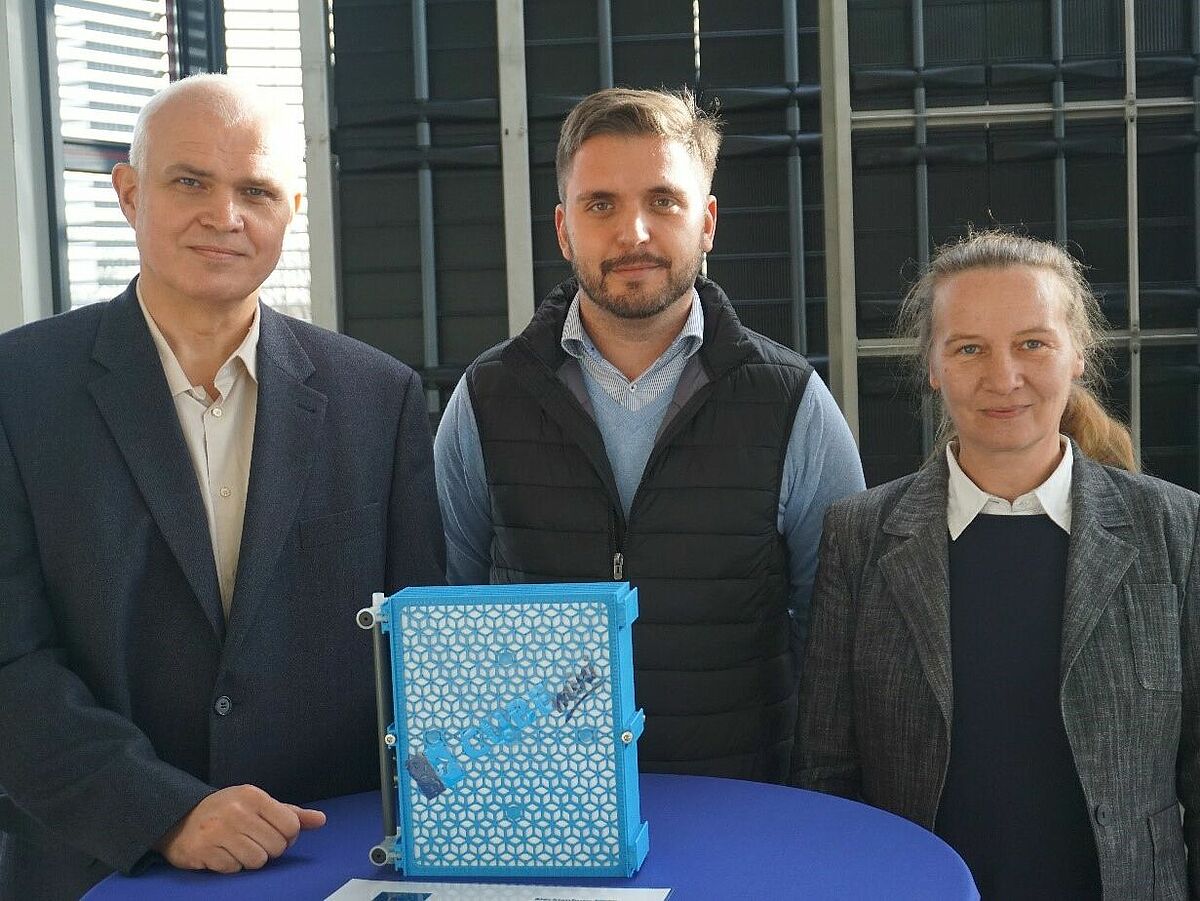As part of the joint project between Martin Systems GmbH and Wismar University of Applied Sciences, a first water treatment system is to be developed that can be installed in various systems and configurations. The product range so far includes solutions for municipal, industrial and maritime water treatment systems for grey and black water. Grey water is defined as faecal-free, slightly polluted waste water according to DIN EN 12056-1; black water as domestic wastewater without grey water containing faecal solids. The heart of the treatment plant is formed by small membrane filter plates, which are installed in compact units as modules (stacks) in the plant. The installed flat membrane modules work according to the principle of ultrafiltration. By means of defined pore sizes, it is possible to separate the finest particles, suspended particles, bacteria, germs, viruses, and a liquid. The membrane retains these substances without changing them physically or chemically. This means that dangerous substances cannot even be produced in the first place. Due to the high demands on water treatment and drinking water production, it is absolutely necessary to carry out a 100% inspection at every production step. The quality of the welded seam "membrane-filter plate" is currently tested by applying air pressure and pulling by means of a vacuum system. In doing so, the time course of the pressure drop across the membrane on the carrier plate is measured. In view of the more sensitive hygienic requirements of the food industry, new plastic materials must be elicited for the implementation of the project.
Facts and results
As part of its sub-project, Wismar University of Applied Sciences is working in the field of material development for the MBR plant, and is investigating the design and configuration of components and assemblies with regard to a design that is suitable for materials, processes and loads. A robust and simple periphery should create the prerequisites for high availability, low susceptibility to faults and low maintenance requirements in the plant to be developed.
Contribution to future topic/change in the region
The need for environmental and resource-friendly manufacturing processes for goods and products in all areas of our lives is growing rapidly in the face of increasing environmental degradation worldwide. MBR plants can directly reduce our society's impact on the environment. The use of MBR plants in urban environments is predestined to protect the earth's energy and resource balance. The self-sufficient system reduces CO2 emissions. The project makes it possible to secure the location in Brüsewitz (company headquarters) and to further expand production capacities.
Project participants: MMS AG, Wismar University of Applied Sciences - IfOD
Employee: Dipl.-Ing. Uwe Hildebrand
Projects
- Development of future technologies (tool and process) for the production of large-area thin-walled 3-D structures with high flatness requirements (V-630-F-099-2010/315) from 01. 01. 2011 - 28. 02. 2013
- Development of a technical/technological realization concept taking into account economic aspects for the component substitution of a membrane plant. (Akt.-Z.: 402652-06-005-RK), An Institute for Polymer Technologies e.V. of Wismar University of Applied Sciences from 01.01.2015 - 31.03.2016
The project
The long-standing cooperation between Wismar University of Applied Sciences (working group: plastics/materials engineering) and the globally active company Martin Systems AG, which specializes in water treatment and drinking water production, continues in the recently approved joint project.
The problem
Water is a scarce resource. Although it covers three-quarters of the earth's surface, less than three percent of the world's available water resources consist of fresh water and can be used by humans. In this form, it is used both as drinking water and industrial water for industry and agriculture. Meeting the demand for water is a global problem, especially in developing and emerging countries. Today, more than 1.1 billion people have no direct access to clean drinking water. The pollution of water is largely due to microbiological causes. Thus, 1.8 million people die annually from water-related diseases (WHO and UNICEF 2011). In Resolution 64/292 of July 28, 2010, the United Nations General Assembly paid special tribute to the importance of water supply for the world's population and recognized access to clean water as a human right.
The solution approach
The core of the treatment plant is formed by small membrane filter plates, which are installed in compact units in the form of modules in the plant and, if necessary, can be easily exchanged individually on-site for repair purposes. Based on a basic module, the planned development is to be freely configurable and thus flexibly adaptable to the respective requirements of the target markets. The module unit to be developed, which includes the surrounding housing structure, should meet the requirements for safe operation in the individual area of the broad consumer class. For the necessary work in material development, Wismar University of Applied Sciences has extensive laboratory equipment at its disposal, such as a heating-cooling mixer, various configurable compounders/extruders and injection moulding machines. Numerous analytical devices, including differential scanning calorimetry (DSC), dynamic mechanical analysis (DMA), thermogravimetric analysis (TGA), melt flow rate (Viscometer), a high-pressure capillary rheometer and microscopy help in the evaluation of the materials. The mechanical, thermal and rheological parameters obtained are used to set up material models for a stress-appropriate design of the components in an FE simulation.
The motivation for the development of the "Cube Mini FM 045" plant was to give people worldwide access to clean water. The innovation of the small plant is the plant concept: to treat water of different origins and different sources, which is polluted in different ways, in such a way that it can then be used individually as drinkable water. Ultrafiltration is used as the main process. A modular filter unit consisting of several filter plates forms the basis for the new generation of devices. The target markets for the innovative, mobile and energy-autonomous water treatment plant are primarily Europe, Asia, North and South America.


